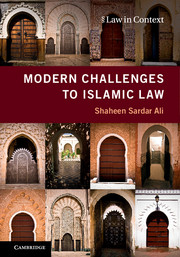Book contents
- Frontmatter
- Dedication
- Contents
- Acknowledgements
- Glossary
- Table of Cases
- Table of Legislation
- Introduction
- 1 Sharia: The Flowing Stream
- 2 An Elephant in the Room or a Needle in a Haystack? Searching for ‘Islamic’ Constitutionalism(s)
- 3 Contextualizing Family Law Reform and Plural Legalities in Post-colonial Pakistan
- 4 In Search of Legitimacy: The Dilemma of Islamic Finance
- 5 Muslim Women's Contributions to Drafting CEDAW: An Untold Narrative
- 6 CEDAW? What's That? ‘Domesticating’ ‘International’ Women's Human Rights in Muslim Jurisdictions: Reflections on Pakistan's Engagement with CEDAW
- 7 ‘Between the Devil and the Deep Blue Sea’: Sharia Councils and Muslim Women's Rights in the British Muslim Diaspora
- 8 Internet Fatawa: Challenging Tradition and Modernity in Women and Gender Issues
- Conclusion
- Bibliography
- Index
2 - An Elephant in the Room or a Needle in a Haystack? Searching for ‘Islamic’ Constitutionalism(s)
Published online by Cambridge University Press: 05 September 2016
- Frontmatter
- Dedication
- Contents
- Acknowledgements
- Glossary
- Table of Cases
- Table of Legislation
- Introduction
- 1 Sharia: The Flowing Stream
- 2 An Elephant in the Room or a Needle in a Haystack? Searching for ‘Islamic’ Constitutionalism(s)
- 3 Contextualizing Family Law Reform and Plural Legalities in Post-colonial Pakistan
- 4 In Search of Legitimacy: The Dilemma of Islamic Finance
- 5 Muslim Women's Contributions to Drafting CEDAW: An Untold Narrative
- 6 CEDAW? What's That? ‘Domesticating’ ‘International’ Women's Human Rights in Muslim Jurisdictions: Reflections on Pakistan's Engagement with CEDAW
- 7 ‘Between the Devil and the Deep Blue Sea’: Sharia Councils and Muslim Women's Rights in the British Muslim Diaspora
- 8 Internet Fatawa: Challenging Tradition and Modernity in Women and Gender Issues
- Conclusion
- Bibliography
- Index
Summary
Introduction
A key challenge in the study of Islamic law is how to approach modern concepts that do not readily avail themselves of comparators within the Islamic legal traditions. This inquiry assumes a more complex nature when those conceptual comparators themselves are evolving, contested and open to varying definitions. Constitutionalism is one such concept which has become the subject of increasing scrutiny challenging traditional conceptions of Muslim state and government.
In its earlier, liberal conceptions, ‘constitutionalism’ was broadly defined and built upon three pillars: upholding the rule of law, the enforcement of effective limitations on governmental powers, and the protection of fundamental rights. This was essentially the model received in the Muslim world, upon which Islamic law was grafted so as to ‘Islamize’ constitutional texts and constitutionalism. But modern constitutionalism presents itself in various forms and raises many different challenges and potential contradictions within itself. Constitutionalism and democracy, for instance, appear ‘intimately related yet intrinsically opposed’, giving rise to much debate regarding ‘constitutional democracy’. Loughlin and Walker alert us to the paradox of constitutionalism in the tensions generated by the power inherent in the people on the one hand and in constitutional forms on the other, through which alone it may be exercised. Other issues at the centre of debates on constitutionalism include the impact of global, transnational and international law and governance networks. The constitutionalization of international law, as well as the pluralist nature of domestic legal structures, poses a threat to the very existence of constitutionalism in its classical form.
As in most areas of the Islamic legal traditions, opinion on Islamic constitutionalism too is far from unanimous. Most Islamic law scholars agree that ‘constitutional law (usul-al-hukm) is one of the most under-developed areas of Islamic law and jurisprudence’. Some Qur'anic verses and the Sunna, however, provide elements on which the structure of constitutionalism may be built, including shura (consultation), bay'ah (allegiance), principles of justice and the accountability of rulers. Other antecedents, including the Medina Charter (discussed below), are also cited in support of the historical beginnings of an Islamic constitutionalism. Despite a number of discernible trajectories within Muslim intellectual thought on the subject, claiming an Islamic constitutionalism as inherently a part of the Islamic traditions would in the opinion of some scholars be an exaggeration and ‘falling prey to an anachronism’.
- Type
- Chapter
- Information
- Modern Challenges to Islamic Law , pp. 41 - 78Publisher: Cambridge University PressPrint publication year: 2016



